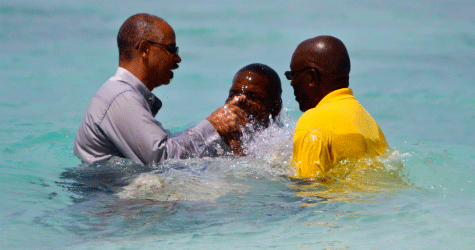A woman lost her life and another person is missing after a drowning incident in Mokolo river during ritual performance.
It is reported that a group of people were busy with their rituals in the said river across the R510 between Thabazimbi and Lephalale on Saturday, 11 June 2022.
During the process the woman overpowered the pastor and sunk into the river.
The pastor tried to rescue her before he was pulled by the water.
Other members of the congregation managed to puĺl the woman out of water and she was rushed to the hospital, where she was certified dead on arrival.
The pastor is still missing and the divers could not find his body and are expected to resume with the search.
In our three-part series on baptism and church membership, we focused last week on the meaning and importance of church membership. And today we focus on the meaning and importance of baptism. The note I want to strike immediately — the tone and the truth that I want to set first and foremost — is that baptism gets its meaning and its importance from the death of Jesus Christ, the Son of God, in our place and for our sins, and from his triumph over death in the resurrection that guarantees our new and everlasting life. Baptism has meaning and importance only because the death and resurrection of Jesus are infinitely important for our rescue from the wrath of God and our everlasting joy in his glorious presence. That’s the note that must be struck first.
We are not mainly talking about religious ritual here. We are not mainly talking about church tradition here. We are mainly talking about Jesus Christ and his magnificent work of salvation in dying for our sins and rising for our justification. Talking about baptism means talking about how Jesus taught us to express our faith in Jesus and his great salvation. So don’t have small thoughts as we begin. Have large thoughts. Great thoughts about great reality — Jesus Christ, the Son of God, crucified to bear the sins of millions and raised to give them everlasting life in the new heavens and the new earth.
Sign, Emblem, and Ordination
To answer the question What is baptism and how important is it? let’s read again what the elders of Bethlehem joyfully affirm in the Bethlehem Baptist Church Elder Affirmation of Faith (Section 12.3), and then look at some of the biblical foundations for it:
We believe that baptism is an ordinance of the Lord by which those who have repented and come to faith express their union with Christ in his death and resurrection, by being immersed in water in the name of the Father and the Son and the Holy Spirit. It is a sign of belonging to the new people of God, the true Israel, and an emblem of burial and cleansing, signifying death to the old life of unbelief, and purification from the pollution of sin.
Let’s take five parts of that affirmation and look at the biblical basis for them.
1. Ordained by Jesus
First, “We believe that baptism is an ordinance of the Lord . . .” What we mean by this is that the Lord Jesus commanded it — he ordained it — in a way that would make it an ongoing practice of the church. We find this most explicitly in Matthew 28:19-20: “Go therefore and make disciples of all nations, baptizing them in the name of the Father and of the Son and of the Holy Spirit, teaching them to observe all that I have commanded you.”
“In baptism, by faith, we are united with Christ in his death, burial, and resurrection.”
“Make disciples” is the main verb: “Having gone, make disciples of all nations.” The defining participles are “baptizing them” and “teaching” them. So the church is commanded to do this for all disciples. Making disciples of all nations includes baptizing them.
And the time frame is defined by the promise of Christ’s help in verse 20: “And behold, I am with you always, to the end of the age.” The promise of help is for as long as this age lasts. So the command he promises to help us with is as long as this age lasts.
So baptism is a command, and ordinance, of the Lord Jesus to be performed in making disciples until Christ returns at the end of the age.
2. Union with Christ
Second, baptism “expresses union with Christ in His death and resurrection.” The clearest teaching on this is Romans 6:3–4:
Do you not know that all of us who have been baptized into Christ Jesus were baptized into his death? We were buried therefore with him by baptism into death, in order that, just as Christ was raised from the dead by the glory of the Father, we too might walk in newness of life.
In the wider context of Romans, I think it would be a mistake to say that water-baptism is the means of our being united to Christ. In Romans, faith is the means by which we are united to Christ and justified. But we show this faith — we say this faith and signify this faith and symbolize this faith — with the act of baptism. Faith unites to Christ; baptism symbolizes the union.
An analogy would be saying, “With this ring I thee wed.” When we say that, we don’t mean that the ring or the putting of the ring on the finger is what makes us married. No, it shows the covenant and symbolizes the covenant, but the covenant-making vows make the marriage. So it is with faith and baptism.
So similarly Paul is saying, “With this baptism you are united to Christ.” And the point we are focusing on here is that we are united to him in his death and burial and resurrection. “We were buried therefore with him by baptism into death, in order that, just as Christ was raised from the dead by the glory of the Father, we too might walk in newness of life.” So the imagery of baptism is death, burial, and resurrection. Christ was buried and raised to new life.
In baptism, by faith, we are united with Christ in his death, burial, and resurrection. Baptism dramatically portrays what happened spiritually when you received Christ: Your old self of unbelief and rebellion and idolatry died, and a new you of faith and submission and treasuring Christ came into being. That’s what you confess to the world and to heaven when you are baptized.
3. Immersed in Water
Third, we believe this expression of union with Christ in death and resurrection happens “by being immersed in water.” The clearest evidence for this is Romans 6:3–4 which describes the act of baptism as burial and rising from the dead. This is most naturally understood to mean that you are buried under water and then come out of from the water to signify rising from the grave.
The word baptism in Greek means dip or immerse. And most scholars agree that this is the way the early church practiced baptism. Only much later does the practice of sprinkling or pouring emerge, as far as we can tell from the evidence.
There are a few other pointers to immersion besides the meaning of the word and the imagery of death and burial. In Acts 8:37–38, the Ethiopian eunuch comes to faith while riding with Philip in his chariot and says, “See, here is water! What prevents me from being baptized?” Philip agrees and it says, “He commanded the chariot to stop, and they both went down into the water, Philip and the eunuch, and he baptized him.” That they “went down into the water” makes most sense if they were going down to immerse him, not to sprinkle him. Similarly it says in John 3:23, “John also was baptizing at Aenon near Salim, because water was plentiful there.” You don’t need plentiful water if you are simply sprinkling. You just need a jar.
So there is really very little dispute that this was the way the early church baptized. They did it by immersing the new believer in water to signify his burial and resurrection with Jesus.
4. Father, Son, and Holy Spirit
Fourth, baptism means doing this immersing in the name of the Father, the Son, and the Holy Spirit. That’s what Jesus said in Matthew 28:19: “Go therefore and make disciples of all nations, baptizing them in the name of the Father and of the Son and of the Holy Spirit.” This means that not just any immersing is baptism.
There is a holy appeal to God the Father and God the Son and God the Holy Spirit to be present in this act and make it true and real in what it says about their work in redemption. There is no salvation without the Father, the Son, and the Holy Spirit. When we call on their name, we depend upon them and honor them and say that this act is because of them and by them and for them.
5. Expression of Faith
Fifth, baptism is an expression of faith and therefore only for believers. The key sentence in the Bethlehem Elder Affirmation says, “We believe that baptism is an ordinance of the Lord by which those who have repented and come to faith express their union with Christ in his death and resurrection.” So our understanding of the New Testament is that the meaning of baptism includes the fact that it is an expression of the faith of the one being baptized. It is not something that an unbeliever can do. It is not something than an infant can do. That is why we don’t baptize infants.
 Moni Malawi
Moni Malawi 

